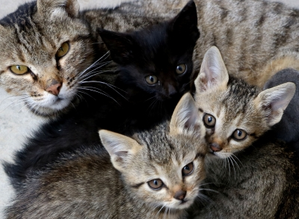H5N1 in cats: Chhindwara on high alert, normalcy expected after March 4
By IANS | Updated: February 28, 2025 14:35 IST2025-02-28T14:32:01+5:302025-02-28T14:35:45+5:30
Bhopal, Feb 28 Normalcy is expected to return after March 4 in Chhindwara town as the H5N1 virus ...

H5N1 in cats: Chhindwara on high alert, normalcy expected after March 4
Bhopal, Feb 28 Normalcy is expected to return after March 4 in Chhindwara town as the H5N1 virus was detected in domestic cats. The meat, chicken, and egg markets are closed and people are advised to visit government hospitals if they have any flu-like symptoms.
The entire tribal-dominated district has been on high alert since February 10. This is the first time in India that domestic cats have been detected with bird flu.
On January 10, according to a senior government official, 99 domestic cats fell sick and were brought to a veterinary hospital, later two of them detected the H5N1 virus. Although avian influenza usually does not infect humans, in rare cases, illnesses in humans from avian influenza virus infections have ranged in severity from no symptoms or mild illness to severe disease that resulted in death.
“The virus might have been transmitted from chicken to these cats fed by their caretakers,” a senior government officer said adding, “So far only local market of chicken and meat has been declared closed for 21 days.”
The H5N1 virus -- commonly associated with birds -- has been detected in cats. In response, the district administration has implemented precautionary measures, including a 21-day prohibition on the sale and purchase of mutton, chicken, and eggs. Meat and poultry shops in the affected areas have also been sealed.
The cats were brought to the local veterinary hospital and doctors were unable to diagnose their problem. After initial efforts to treat them, the doctors intimated the Bhopal district lab. A team of experts visited Chhindwara and collected samples.
“To investigate, samples from several cats were sent to Pune’s National Institute of Virology on January 15 and 22.
He further said that raw meat samples were collected from shops linked to the deceased cats' diet. Bird flu traces found at these shops prompted the destruction of related meat and eggs, accompanied by a 30-day closure of the establishments.
Moreover, samples from 65 people in contact with the infected cats were also tested. “All results came back negative. Nevertheless, health officials remain vigilant, with ongoing surveillance in the area in a radius of 10 km.”
To control the spread, authorities destroyed 40,000 eggs and culled 500 hens and chickens.
Disclaimer: This post has been auto-published from an agency feed without any modifications to the text and has not been reviewed by an editor
Open in app